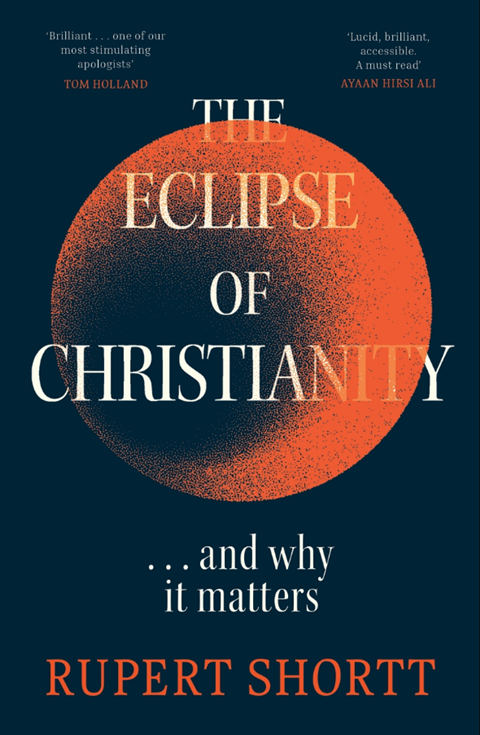Rupert Shortt’s new book offers a solid critique of today’s secular culture and a penetrating analysis of the problems facing Christian faith today. But it’s also deeply hopeful about the future, says Paul Valler

The Eclipse of Christianity: and why it matters (Hodder & Stoughton) is an excellent book. It begins by charting the demise of the mainstream Church over the last century, showing how Christian influence has been progressively eroded and marginalised. Public spaces have now been largely evacuated of Christianity, and the media has “embarrassed religion out of existence”, he says.
Yet even as Christianity has apparently faltered, Shortt maintains that humanity’s age-old quest for meaning is undimmed. People are still finding that the private, autonomous self is not the final arbiter of meaning and value. Secularism has failed to give hope or provide answers to the ultimate questions of life.
Deep questions
Forget trying to skim read this book. Shortt is a deep thinker, and his writing challenges us to do the same. Exploring faith, he asks questions of Darwinism such as: Why does humanity, of all creatures, have the capacity to grasp concepts, morals, meaning and truth? Why are we motivated by the arts, spirituality and a vision of the good?
The routine ridicule and exclusion of Christianity has become almost normative
In an excellent chapter on the credibility of the creed, he points out that people who reject God often do not do so for intellectual reasons. Instead of any forceful assertion of credal orthodoxy, he gently and powerfully poses questions that lead the reader towards arguments for faith, including encouraging examples of journeys back to Christian belief from people who had wandered, doubted, or previously rejected Christianity.
A strong case
Although the Church has declined in credibility, influence and size, Shortt demonstrates how it has continued to contribute vital social capital through promoting shared values and providing local resources and activities for the common good. He makes a strong case that, despite the many failures and mistakes of the Church, Christianity is still the best way to preserve key values without which civilisation would wither.
A chapter on the explosion of Pentecostalism and fresh expressions of church shows how recent trends are beginning to reshape and even reverse the numerical decline in the Church. And the last part of the book on culture is outstanding.
Counter cultural
Contrasting artificial and spiritual intelligence, Shortt ridicules the idea that humans are ultimately just sophisticated robots. AI is limited by its left brain, machine-dominated paradigm and an algorithmic approach to learning. Since being embodied and organic is essential to being truly human, could a disembodied or machine AI ever genuinely suffer, or experience real emotional attachments? Could AI ever pass “the Jesus test” - to choose to sacrificially switch itself off for the benefit of users?
In a brave chapter on medical ethics, Shortt also nails his pro-life colours to the mast. He quotes a letter to The Sunday Times which describes an abortion activist holding a placard: “Not your body, Not your life, Not your choice”. The letter writer’s rebuttal said: “It’s not your body: the unborn child is a separate unique human being. It’s not your life: the unborn child has its own right to life. It’s not your choice: no one has the right to kill another innocent human being.”
On euthanasia, Shortt also points out that the secular insistence on self-determination has little to offer the person in a coma or vegetative state, or in the helplessness that is ours at both the beginning and end of life.
Secularism has failed to provide answers to the ultimate question of meaning in life
Turning his attention to media, he is scathing about the sidelining of Christianity in broadcasting, citing several examples of clear bias in the BBC, where the routine ridicule and exclusion of Christianity has become almost normative. Regarding diversity, I laughed out loud at his example of the National Trust’s new “inclusive calendar” published in November 2023, which featured the dates of Diwali, Ramadan and Eid, but not those of Christmas!
A new dawn
Well researched and brimming with examples, sometimes Shortt’s informative writing is so rich that it feels like the equivalent of eating a whole Christmas pudding in one sitting. Overall, he delivers a forensic and trenchant exposé of anti-Christian bias in today’s culture, and a convincing argument for the failure of new atheism and secularism.
Perhaps the word ‘eclipse’ in his title is prophetic. During an eclipse, the light of the sun is extinguished and then, after an interval, reappears. In the same way, the promise implicit in this book is that the present eclipse of Christianity will give way to a new season of light.
Let’s pray that it is so.






































No comments yet